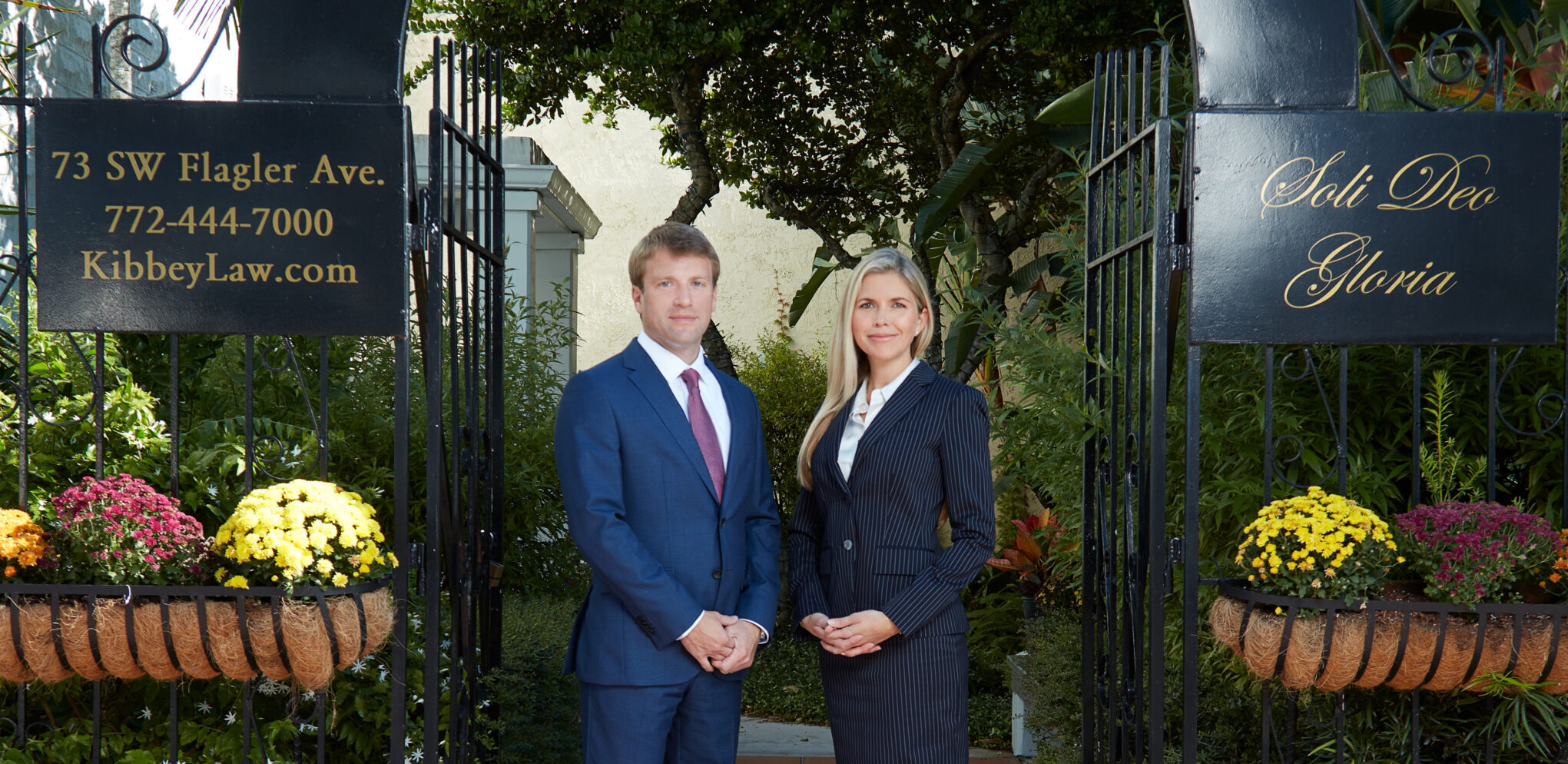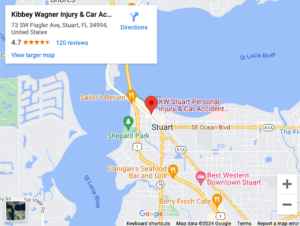
Florida has many laws that apply specifically to motorcycles. Legislators passed these laws to protect motorcyclists from the dangers posed by other motorists, as well as unsafe riding habits. These laws cover everything from helmet use to licensing requirements.
When riders fail to follow established motorcycle laws, they can cause accidents and suffer serious injuries. Importantly, riders in Port St. Lucie, FL, may lose their right to seek full compensation for their injuries if their violations contributed to their injuries.
Call (772) 247-3374 to schedule a free consultation with a top-rated attorney at Kibbey Wagner Injury & Car Accident Lawyers Stuart.
How Kibbey Wagner Injury & Car Accident Lawyers Stuart Can Help After a Motorcycle Accident in Port St. Lucie

The Port St. Lucie motorcycle accident lawyers at Kibbey Wagner Injury & Car Accident Lawyers Stuart have over 40 years of combined experience representing accident victims. Since the firm’s founding in 2014, they’ve recovered more than $60 million in compensation for its clients.
Some notable case outcomes obtained by the firm include:
- $6 million auto accident settlement involving catastrophic injuries
- $1 million auto accident settlement for a neck injury
- $800,000 rear-end accident settlement
Our personal injury attorneys in Port St. Lucie, FL, can assist after a motorcycle accident by:
- Conducting a thorough internal investigation into your case to strengthen your compensation claim
- Negotiating a fair settlement on your behalf and bringing your case to court if the other party refuses to negotiate in good faith
- Apprising you of your legal options as your case goes forward
You can be injured in a motorcycle accident even when you comply with the law. Contact Kibbey Wagner Injury & Car Accident Lawyers Stuart in Port St. Lucie, Florida, for a free consultation to discuss the injury compensation you can seek for your injuries.
Motorcycle Laws in the United States
Every state has laws that pertain specifically to motorcycles and their operators. For example:
- All states require a special license to operate a motorcycle
- A total of 47 states plus Washington D.C. have helmet laws applying to some or all riders
- All states require proof of financial responsibility, such as (but not always) motorcycle insurance
States have these laws because of the many dangers motorcyclists face. Motorcycles can tip over when motorcyclists lose their balance or the tires lose traction. They also have a higher power-to-weight ratio that novice riders might have difficulty controlling.
Most motorcycles don’t have a separate passenger compartment to protect passengers during a crash. And since they lack seat belts, riders can easily be ejected in the event of an accident.
Furthermore, drivers often fail to spot motorcycles due to their compact size. They can also misjudge the distance or speed of a motorcycle as it approaches them.
All of these factors combine to make motorcycle accidents more common — and more lethal — than car accidents.
Overview of Motorcycle Laws in Florida
Florida aligns with the majority of states with several motorcycle laws, including those requiring:
- Motorcycles and riders to possess certain equipment
- Riders to follow specific traffic laws
- Riders to obtain a valid motorcycle license
Notably, Florida is the only state that does not require motorcycle riders to purchase insurance. Florida motorcycle and moped riders must comply with the state’s traffic and motorcycle laws. In turn, Florida law gives motorcycle and moped riders the same right to use the roads as automobile drivers.
Equipment Laws
Motorcyclists who buy stock vehicles usually get properly-equipped motorcycles. But those who build custom cycles or modify their vehicles must be aware of local equipment laws.
In Florida, your motorcycle must have footrests if you intend to carry passengers. All motorcycles must have a headlight, turn signals, stop lights, and tail lights, and they cannot have so-called “ape hanger” handlebars.
Florida law also prescribes the rider’s equipment. All riders must have eye protection, and both operators and their passengers must wear helmets unless they are over 21 and have health insurance.
Traffic Laws
Florida law allows motorcyclists to ride side-by-side or single file, but the law prohibits more than three motorcycles from riding abreast in a single lane.
Motorcycle laws in Florida prohibit motorcycles from “lane splitting” or “lane filtering.” In these maneuvers, the motorcyclist rides between lanes along the intervening line. This practice, which is legal in a small number of states, permits motorcycles to move to the front of a lane of stopped or slowing traffic.
Lane splitting substantially reduces a motorcyclist’s risk of being rear-ended by a car but increases the risk of lane change accidents.
Financial Responsibility Laws
Florida requires all motorcycle owners to prove financial responsibility. This means they must show they have the resources to pay for any damage they might cause in a crash.
Most motorcycle owners meet the financial responsibility requirement by buying motorcycle insurance, but Florida also allows riders to prove they own enough assets to self-insure.
Motorcycle Licensing Laws
You must take a motorcycle safety course to obtain a motorcycle license. If you move from another state, Florida will only grant you a reciprocal motorcycle license if your home state requires a motorcycle safety course.
Effect of Legal Compliance on Injury Claims
Florida uses comparative negligence to determine each person’s share of the liability for an accident. If you failed to comply with Florida’s motorcycle laws and got injured in an accident, you could bear some or all of the liability for the accident.
As a result, you might not be entitled to recover compensation for your injuries. Worse yet, you might need to pay the damages associated with someone else’s injuries.
Schedule a Free Consultation With Our Motorcycle Crash Lawyers in Port St. Lucie, FL
A motorcycle accident can leave you with significant medical expenses and even prevent you from working. Contact Kibbey Wagner Injury & Car Accident Lawyers Stuart for a free consultation to discuss your case with an experienced Port St. Lucie motorcycle accident attorney.

